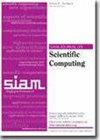用通用形式提霍诺夫正则化处理线性逆问题的预处理克雷洛夫子空间方法
IF 2.6
2区 数学
Q1 MATHEMATICS, APPLIED
引用次数: 0
摘要
SIAM 科学计算期刊》,第 46 卷第 4 期,第 A2607-A2633 页,2024 年 8 月。 摘要Tikhonov 正则化是一种广泛应用于逆问题求解的技术,它可以对所求解强制执行先验特性。本文提出了一种基于 Krylov 子空间的迭代方法,用于求解带有一般形式 Tikhonov 正则化项 [math](其中 [math] 为正半有限矩阵)的线性逆问题。我们设计了一种称为预处理 Golub-Kahan 二对角化(pGKB)的迭代过程,它隐含地利用适当的预处理来生成一系列具有正则化[math]所编码的理想特性的求解子空间。基于 pGKB 过程,我们提出了一种通过将原始问题投影到小维度解子空间的迭代正则化算法。我们分析了该算法的正则化特性,包括将所需解的先验特性纳入解子空间以及正则化解的半收敛行为。为了克服半收敛引起的不稳定性,我们进一步提出了两种基于 pGKB 的混合正则化算法。所有提出的算法都在小型和大型线性逆问题上进行了测试。数值结果表明,这些迭代算法表现出色,在某些情况下优于其他最先进的算法。本文章由计算机程序翻译,如有差异,请以英文原文为准。
A Preconditioned Krylov Subspace Method for Linear Inverse Problems with General-Form Tikhonov Regularization
SIAM Journal on Scientific Computing, Volume 46, Issue 4, Page A2607-A2633, August 2024.
Abstract. Tikhonov regularization is a widely used technique in solving inverse problems that can enforce prior properties on the desired solution. In this paper, we propose a Krylov subspace based iterative method for solving linear inverse problems with general-form Tikhonov regularization term [math], where [math] is a positive semidefinite matrix. An iterative process called the preconditioned Golub–Kahan bidiagonalization (pGKB) is designed, which implicitly utilizes a proper preconditioner to generate a series of solution subspaces with desirable properties encoded by the regularizer [math]. Based on the pGKB process, we propose an iterative regularization algorithm via projecting the original problem onto small dimensional solution subspaces. We analyze the regularization properties of this algorithm, including the incorporation of prior properties of the desired solution into the solution subspace and the semiconvergence behavior of the regularized solution. To overcome instabilities caused by semiconvergence, we further propose two pGKB based hybrid regularization algorithms. All the proposed algorithms are tested on both small-scale and large-scale linear inverse problems. Numerical results demonstrate that these iterative algorithms exhibit excellent performance, outperforming other state-of-the-art algorithms in some cases.
Abstract. Tikhonov regularization is a widely used technique in solving inverse problems that can enforce prior properties on the desired solution. In this paper, we propose a Krylov subspace based iterative method for solving linear inverse problems with general-form Tikhonov regularization term [math], where [math] is a positive semidefinite matrix. An iterative process called the preconditioned Golub–Kahan bidiagonalization (pGKB) is designed, which implicitly utilizes a proper preconditioner to generate a series of solution subspaces with desirable properties encoded by the regularizer [math]. Based on the pGKB process, we propose an iterative regularization algorithm via projecting the original problem onto small dimensional solution subspaces. We analyze the regularization properties of this algorithm, including the incorporation of prior properties of the desired solution into the solution subspace and the semiconvergence behavior of the regularized solution. To overcome instabilities caused by semiconvergence, we further propose two pGKB based hybrid regularization algorithms. All the proposed algorithms are tested on both small-scale and large-scale linear inverse problems. Numerical results demonstrate that these iterative algorithms exhibit excellent performance, outperforming other state-of-the-art algorithms in some cases.
求助全文
通过发布文献求助,成功后即可免费获取论文全文。
去求助
来源期刊
CiteScore
5.50
自引率
3.20%
发文量
209
审稿时长
1 months
期刊介绍:
The purpose of SIAM Journal on Scientific Computing (SISC) is to advance computational methods for solving scientific and engineering problems.
SISC papers are classified into three categories:
1. Methods and Algorithms for Scientific Computing: Papers in this category may include theoretical analysis, provided that the relevance to applications in science and engineering is demonstrated. They should contain meaningful computational results and theoretical results or strong heuristics supporting the performance of new algorithms.
2. Computational Methods in Science and Engineering: Papers in this section will typically describe novel methodologies for solving a specific problem in computational science or engineering. They should contain enough information about the application to orient other computational scientists but should omit details of interest mainly to the applications specialist.
3. Software and High-Performance Computing: Papers in this category should concern the novel design and development of computational methods and high-quality software, parallel algorithms, high-performance computing issues, new architectures, data analysis, or visualization. The primary focus should be on computational methods that have potentially large impact for an important class of scientific or engineering problems.

 求助内容:
求助内容: 应助结果提醒方式:
应助结果提醒方式:


